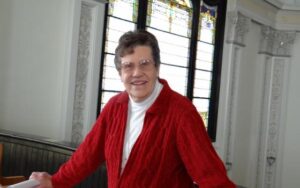The God Who Sees

Photo by Tyler Nix on Unsplash
March 16, 2022
“I believe that I shall see the goodness of the Lord In the land of the living.” Psalm 27:13
We prayed this Psalm on Sunday. Nestled between stories of God’s covenant with Abraham and Jesus’ Transfiguration it would have been easy to miss the slender verse in the flood of narratives.
So I want to slow us down, bring us back to ponder this statement of tenacious faith.
I imagine these words prayed through gritted teeth. In the face of countless sieges, forced marches from Jerusalem, and life in exile after leaders failed to avoid war. They speak of a belief in God’s promises here in the land of the living. Not only in the hereafter.
On this synodal path we seek to renew a Church where each of us finds our place of belonging, our place to serve, and our place to be nourished as part of the People of God. And yet: so many feel unseen in the crowd. Nameless. Anonymous. Unsure of what gift we have to bring. Not so sure that it will be received here in the land of the living. This is a human struggle: to become part of a people, to come to know a God who knows us intimately and calls us into a vast communion.
And yet – it is also true that women have, in a particular way, struggled mightily to be seen. Their stories are not always included in our lectionary… and so it may take some combing through our Scriptures for us to reinvigorate the fullness that our tradition offers us. A witness of faithful women, praying through gritted teeth – insisting that God’s promises be enfleshed here, in the land of the living.
The song –“God of every daughter”– does some faithful-song-prayer-work for us. Songwriter Sus Long tells of the God who Hagar encounters as she’s cast into the wilderness: the God who sees. We are reminded of the God who bore witness to Tamar’s rape – and refused to let her story be blot out from the Biblical memory.
It is a song that was written by women while they were reading the bible together in prison.
A song written out of a desire to know that God sees women in prison. God sees the women fleeing war. God sees the victim of domestic violence.
God also sees the preacher hiding in the back pew, weeping, then wiping her tears so she can carry on with the work of serving and ministering that she trusts she’s called into.
And it is the prayer of Psalm 27 through gritted teeth –I WILL see the goodness in the land of the living. Because this is not only the God of our fathers– it is the God of every daughter.
This is the good news that keeps us walking and singing.
When I first shared the song with a close friend, she responded: this is the anthem of discerning deacons. “Play it at every gathering, as part of every prayer service.”
So I offer it for you today, recognizing that the synodal path invites us to become more visible. To trust in the God who sees… and who calls us to speak with parrhesia -boldness- about what it is we have seen and heard and known.


